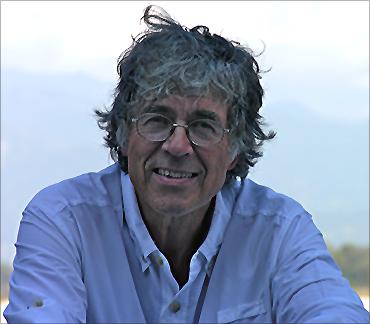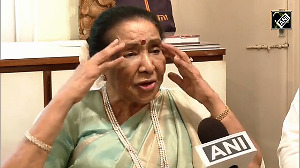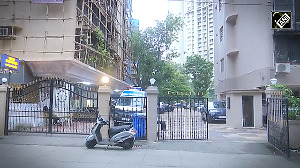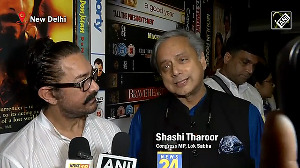 My research on earthquakes in India has been misrepresented in the media and I have been dubbed an activist. But for heaven's sake, I am a researcher, and I have not been speaking against the nuclear facilities in India but only looking at the possibilities of earthquakes, says Professor Roger G Bilham, who has been blacklisted by the Indian government for his views.
My research on earthquakes in India has been misrepresented in the media and I have been dubbed an activist. But for heaven's sake, I am a researcher, and I have not been speaking against the nuclear facilities in India but only looking at the possibilities of earthquakes, says Professor Roger G Bilham, who has been blacklisted by the Indian government for his views.
A geologist at the University of Colorado, Boulder, USA, who was stopped on May 19, 2012, on arriving in New Delhi en route to Bhutan to undertake scientific research and was sent back to America, says the new Indian government edict requiring all scientists to apply for a specific purpose visa for conferences and collaborative research is not going to help him -- or fellow scientists and other academics.
"The latest nonsense about the visa is another red herring," Professor Roger G Bilham said in a lengthy phone interview. "I am told by the (US) State Department that I am on India's blacklist. The reasons will not be given out, I believe I am prohibited from entering India 'for unspecified national security/intelligence reasons'."
He added: "To class my scientific publications as journalism is misinformed and insulting. I have been placed on a list of terrorists for simply writing and speaking about earthquakes in India. Most scientists in India consider me to be an authority on the subject."
Bilham, whose writing on earthquake possibilities in India especially in 'sensitive' regions upset some Indian geologists, says the new visa rule is meant to blunt the criticism he was deported because he had the wrong visa.
"In January 2012 my visa was sent to, inspected and cleared by the Indo-US forum organisers in Gandhinagar for both the meeting AND especially for access to the Kutch area which is close to the Pakistan border," he wrote. "It was approved. In May 2012, when I was forced back to the plane in transit to Bhutan, I was using my multi-entry visa only to stay in a hotel near the airport after the 18 hours of flying before my flight to Paro the next day."
People who have questioned his research without scientifically looking at it, he admits, had a "cast iron" case against him since he had been going to India on a tourist visa. "I thought having a multiple tourist visa would make things easier for me," he said in a phone chat. "I had never hidden why I was going to India, and all my travels had been approved by government agencies. But when I was deported, I was not even going anywhere in India. I was on the way to Bhutan and I had a visa for that country."
On January 2, 2013, the home ministry asserted that scientists in possession of tourist visas are not permitted to attend conferences or to write about the tectonics of India.
"There are all kinds of stories about me that have appeared about me in the Indian media," he said. "Some have said I have been visiting India secretly since 1967. My research on earthquakes in India has been misrepresented in the media and I have been dubbed an activist. But for heaven's sake, I am a researcher, and I have not been speaking against the nuclear facilities in India but only -- and that too working with Indian geologists -- looking at the possibilities of earthquakes."
In the past few months, he has been trying to find out more about his expulsion. "Who would I ask? The prime minister?" he wondered out loud. "I did not know who to ask about my situation," he said. "So I went to the State Department and I learned that I am on the blacklist."
He said the Foreigners Regional Registration Office of the Government of India indicates that "they cannot share any information about the reasons [for blacklisting] because it is a national security/intelligence issue". The list includes terrorists, journalists and, apparently, at least one scientist, he added.
And this holds dangers to scientists, social scientists, and other academics whose work might have worried some bureaucrats and fellow academics, he said.
"One does not know whether one is on the blacklist except by attempting entry, or by diplomatic enquiry," he added.
News of his blacklisting was announced at the December 2012 international conference of geologists during a session on the imprisonment of seismologists in Italy who were accused of not clarifying the true risks from future earthquakes in L'Aquila, he said. At the meeting it was also noted that the Indian government has apparently chosen to suppress the open discussion of future seismicity in India.
"Scientists have only one mode of operation -- the search for truth in the physical universe," said Bilham who in the past 25 years has published more than 80 articles on the tectonics of the Indo-Asian collision, and the history of earthquakes in India, most of which he insists are only of academic interest. However, an article coauthored by Professor V K Gaur, published in November 2010, "triggered unexpected interest in the press."
The article articulated well known, uncontroversial issues related to the seismicity of southern India, he continued, adding that what singles this article from others is that it mentions earthquakes in the context of the design accelerations needed for correctly engineering the planned Jaitapur Nuclear Power station in Maharashtra, nearly 400 km off Mumbai.
The theme of the Jaitapur article was that despite the absence of a historical precedence for any significant seismicity, a Mw=6 earthquake cannot be excluded from occurring near the planned plant, he continued. 'Given that the Fukushima plant shut down safely in a Mw=9.1 earthquake (30,000 times more energy than a Mw=6 earthquake), this article should have caused no concern to the public, or to the press,' he has written. 'The design for Jaitapur is merely a starting parameter for earthquake engineers to correctly construct a power plant.'
Following the publication of this article, representatives from Greenpeace asked Bilham whether he would explain the gist of the article to reporters during his next visit to India. They indicated specifically that Indian seismologists were unwilling to talk to them about seismicity near Jaitapur "for fear of government repercussions," he said. He agreed to talk so long as they made it clear that he was not representing Greenpeace, nor talking about nuclear power, and was being asked only to comment on earthquake issues discussed in the published article. The interview happened on January 12, 2011, and the video is available online.
Summarising his experiences that led to further controversies, Bilham recalled his address at the Indo-US workshop on intraplate seismicity in Gandhinagar, Gujarat. 'The session was chaired by Harsh Gupta, member, National Disaster Management Agency, who, at its conclusion, asked one question and dismissively interrupted Bilham's reply. The question was, 'How can you possibly justify forecasts of future seismic risk based only on historical catalogues',' he has written. 'Since the preceding 30-minute talk had specifically addressed the problems attending this question Dr Gupta was either not listening, or was instead asking a question about procedures discussed in a paper.'
His second talk highlighted the danger of flooding to Srinagar from small earthquakes blocking the Jhelum downstream from Baramulla, and proposed a maximum credible earthquake (Mmax) for Kashmir of Mw=8.9. 'No questions arising from this talk were permitted from the audience by conference convener Prof Bal Rastogi on the grounds that the topic was not central to the theme of the workshop,' Bilham has written in his own account of the proceedings.
At a closed session meeting of organisers following these two talks, Gupta asked why Bilham had been invited to talk at the meeting, he added. 'Evidently dissatisfied with the answer, Gupta voiced an opinion that Bilham's future access to Indian science could be restricted,' he asserted.
"My critics were not offering science in questioning my research," Bilham said in the phone interview. "They were shooting hot air."
On July 25 an article by Prof B Rastogi was published by Current Science critical of a number of typos in Bilham and Gaur's article. In it Dr Rastogi indicated that the site investigation for Jaitapur (still publicly unavailable) has done everything possible to prove that no earthquake can occur, echoing the January 17 press release of the Nuclear Power Corporation of India, Bilham's long note of explanation says. Errors and misunderstandings in Prof Rastogi's article, however, and the current public secrecy concerning the Jaitapur site investigation, prompted the publication of a sequel discussing geological and geophysical considerations for the assessment of future seismicity. Both Gupta and Rastogi did not respond to an email from rediff.com asking for their views.
The second article reaffirms the conclusion that 'tectonically, the Jaitapur region is precisely in the same state of seismic quiescence and historical ignorance as the regions of Latur or Koyna were, prior to the damaging earthquakes for which they are now famous.' The article explains the physics and tectonics of how earthquakes can occur near Jaitapur and suggests that the coastal Vijaydurg Fault may have slipped in several Mw=7 earthquakes in the past, Bilham added. 'This fault passes within 10 km of Jaitapur. Numerous types of site investigation to confirm or refute recent activity on this fault, or other offshore faults, are mentioned in the article with the expectation that they have been addressed in the publicly unavailable site study,' Bilham's long note reveals.
Bilham also notes that between January and October he was contacted by several young Indian scientists 'indicating that due to intimidation and threats of job security they could no longer collaborate scientifically and would need to curtail future correspondence.'
"I would love to go to India, I love the country," Bilham added. "I have been advising many PhD students there. But I am caught in the kind of world Kafka created in his novel The Trial. I don't know what the authorities think are my mistakes."







